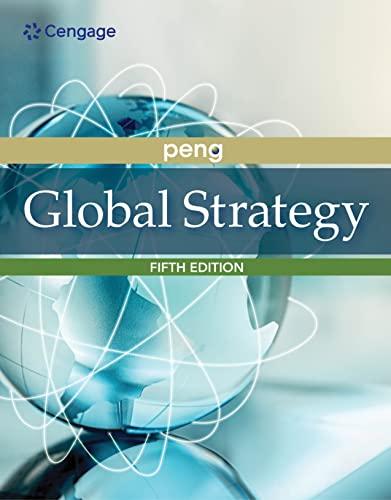Founded in 1938, Samsung Group is South Koreas leading conglomerate. It has 320,000 employees in 510 units
Question:
Founded in 1938, Samsung Group is South Korea’s leading conglomerate. It has 320,000 employees in 510 units in 80 countries, with more than $300 billion in annual revenues in 2019. The flagship company within Samsung Group is Samsung Electronics Corporation (SEC), which enjoyed $206 billion revenues in 2019. In addition to SEC, other major Samsung Group companies include Samsung Life Insurance (the 13th-largest life insurer in the world), Samsung C&T Corporation (one of the world’s largest developers of skyscrapers and solar and wind power plants), and Samsung Heavy Industries (the world’s largest shipbuilder).
Contributing approximately 20% of South Korea’s GDP, Samsung’s performance has been impressive. Clearly, Samsung has done something right. However, it has not been easy. To increasingly compete outside South Korea, Samsung needs to attract more non-Korean talents.
But given its traditionally rigid hierarchical structure and the language barrier, its efforts to attract and retain non-Korean talents was often disappointing. In response, Samsung Group headquarters in 1997 set up a unique internal consulting unit, the Global Strategy Group, which reports directly to the CEO. Members of the Global Strategy Group are non-Korean MBA graduates of top Western business schools who have worked for leading multinationals such as Goldman Sachs, Intel, and McKinsey.
They are required to spend two years in Seoul and study basic Korean. The group’s mission, according to its website, is to
“(1) develop Samsung managers,
(2) grow Samsung performance,
(3) expand Samsung globally.”
Newly hired Global Strategists, which is the official job title, work on critical and high-impact projects across diverse industries, functions, and locations. The overall goal of the Global Strategy Group is to build a pipeline of tomorrow’s leaders who will lead Samsung and its affiliated companies. By 2013, Samsung’s Global Strategists came from 18 countries with 19 native languages, had six years of average work experience, and was on average 30 years old. With Samsung’s rapid global growth, the Global Strategy Group has successfully trained and transitioned many alumni to various management roles at subsidiaries worldwide. Today, these alumni have key roles in driving Samsung’s growth and transforming Samsung into a premier global organization.
Global Strategy teams work on various internal strategy consulting projects for different Samsung companies. Each team has a project leader, which gives the individual an opportunity to take on a leadership role in a high-level consulting project much earlier than in a typical consulting career. Each team has one to two Global Strategists. It also has a project coordinator, a senior Korean manager acting as a liaison between the team and the management of the (internal) client company. On average, projects last three months and typically involve some overseas travel. Starting with 20 Global Strategists in the class of 1997, hundreds of projects have been completed. These projects help Global Strategists form informal ties and expose them to the organizational culture.
After two years, Global Strategists “graduate” and are assigned to Samsung headquarters as strategic staff or subsidiaries in South Korea as line managers for an additional two years. Overall, Global Strategists are required to live and work in South Korea for four years. After this period, they are typically assigned to Samsung subsidiaries in various countries, many of which are in their home countries.
There are also opportunities for alumni from the Global Strategy Group to work in South Korea or in countries other than their own. Why does Samsung impose this highly unusual four-year residence requirement? Global Strategy Group’s website explains: “This requirement is in place so that it gives a Global Strategist ample time to learn and understand the Samsung culture as well as how to work effectively and achieve great success with corporate headquarters after transitioning to an overseas subsidiary.”
Despite good-faith efforts by both Korean and non-Korean sides, the success of the Global Strategy Group is anything but ensured. Overall, cultural integration is a tough nut to crack. Of the 208 non-Korean MBAs who joined the group since its inception, 135 were still with Samsung as of 2011.
The most successful ones are those who have taken the greatest pains to fit into the Korean culture, including eating kimchi and drinking Korean wine at dinner parties. Before the establishment of the Global Strategy Group, not a single non-Korean MBA lasted more than three years at SEC. With the Global Strategy Group as a cohort group, one-third of the non-Korean MBAs in the first class of 1997 were still with SEC three years later (in 2000). Over the next decade, the retention rate went up to two-thirds.
Three experts noted how the non-Korean members of the Global Strategy Group have slowly, but surely, globalized Samsung’s corporate DNA: The effects of these employees on the organization have been something like that of a steady trickle of water on stone. As more people from the Global Strategy Group are assigned to SEC, their Korean colleagues have had to change their work styles and mindsets to accommodate Westernized practices, slowly and steadily making the environment more friendly to ideas from abroad.
Today, SEC goes out of its way to ask the Global Strategy Group for more newly hired employees.
Case Discussion Questions
1. Using the integration-responsiveness framework for multinational strategic choices, can you explain why Samsung is so interested in tapping into the non-Korean talent pool?
2. In competition with other multinationals, how can Samsung attract and retain top talents from around the world?
3. As a non-Korean graduate from a top MBA program, why would you choose to commit four years of your life to working for Samsung and living in South Korea, a country that you have never visited before?
Step by Step Answer:






